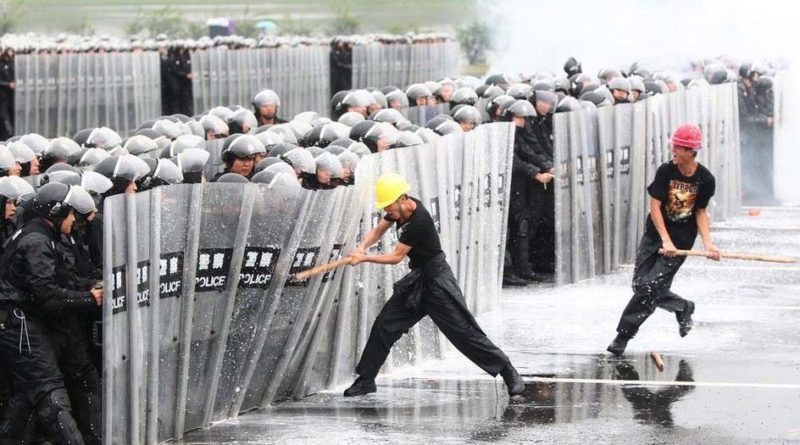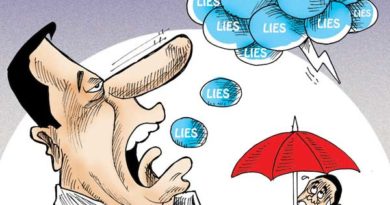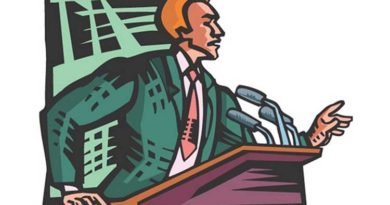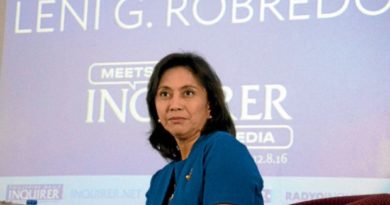OP-ED: ST EDITORIAL – Iran’s unrest needs tackling at the root | THE STRAITS TIMES
Photo file from the Internet….
.
After a week of massive protests against the regime that rules Iran, there appears to have been a pause in the demonstrations.
Meanwhile, at least 20 people have died, including three security officers, in the unrest that began in Mashhad, the country’s second-largest city after Teheran.
Hundreds are in detention.
Not since 2009, when protests erupted in Teheran after people disputed election results, has the country seen such turmoil.
Unlike the 2009 scenes though, this one has often turned violent.
What was an uprising against dismal economic conditions has turned into something far more potent.
The ayatollahs who run the Middle East’s second-largest nation, also a substantial military power, are shaken.
READ MORE …. http://www.straitstimes.com/opinion/st-editorial/irans-unrest-needs-tackling-at-the-root
RELATED NEWS /ARTICLE.
NEWS/IRAN
Five things you need to know about protests in Iran
![Five things you need to know about protests in Iran The recent demonstrations are described as the largest in Iran since post-election unrest in 2009 [Anadolu]](https://www.aljazeera.com/mritems/imagecache/mbdxxlarge/mritems/Images/2017/12/31/bbd86ad76cc849bfa2edf0ef5efa2b74_18.jpg)
There are growing tensions in Iran after anti-government protests erupted over the country’s economic policies across different cities.
Dozens of people have been killed in the demonstrations, which started on December 28.
Here are five things you need to know:
What’s happening?
Iranians began protesting on Thursday in the second-largest city of Masshad, rallying against high prices.
While some say economic woes are caused by Iran’s foreign policy, as the country is involved in regional conflicts, others say sanctions have ultimately hit people’s pockets.
By Friday, rallies spread to the capital, Tehran, and other major cities.
According to local media reports, thousands have taken to the streets to voice their frustration against the government.
Following days of demonstrations, about 400 protests have been reportedly arrested.
The protests have gained momentum, turned deadly and are described as the largest in nearly a decade.
|
|
In the capital, Tehran, dozens of students on Saturday chanted anti-government slogans outside Tehran University, before being dispersed by riot police and large crowds of pro-government demonstrators.
Videos posted on Twitter by the New York-based Center for Human Rights in Iran appeared to show police in riot gear clashing with protesters outside the gates to the Tehran University.
On Sunday, the government restricted access to the Instagram and Telegram social media apps as a security measure.
What are protesters demanding?
Some protesters are rallying against rising prices, unemployment and economic inequality, according to anti-government activists and Iran’s semi-state news agency Fars.
Others are also chanting anti-government slogans against the country’s foreign policy, such as “Death to Rouhani”, “Forget Palestine”, “Not Gaza, not Lebanon, my life for Iran”.
“Because of [President Hassan] Rouhani’s failed economic policies, there was a simmering discontent below the surface that is now emerging,” Ali Fathollah-Nejad, visiting fellow at the Brookings Doha Center, told Al Jazeera.
“On the other hand when it comes to political repression, things have not improved,” he said. “So basically, there are both socioeconomic and political grievances.”
Meanwhile, Potkin Azarmehr, a blogger who focuses on the secular pro-democracy struggle in Iran, told Al Jazeera that several groups have been protesting for some time “and now their slogans have become more radical”.
What does the government say?
Iran’s government acknowledged people’s concerns over the economy but warned demonstrators against disruptive behaviour.
“Those who damage public property, disrupt order and break the law must be responsible for their behaviour and pay the price,” Abdolrahman Rahmani Fazli said on state television early on Sunday.
Fazli had earlier called on people not to participate in what he termed “illegal gatherings”.
 |
| According to the local media, thousands have taken to the streets so far [Anadolu] |
Eshaq Jahangiri, first vice president of Iran, said on Friday that while some protesters were rallying against high prices, others were set on derailing the government.
“All economic indications in the country are good. Yes, there is an increase in the prices of some products and the government is working on fixing causes of high prices,” he said.
“The people behind what is taking place think they will be able to harm the government. But when social movements and protests start in the street, those who have ignited them are not always able to control them.”
Meanwhile, Habibollah Khojastepour, security deputy of the governor of Lorestan province, said on Sunday that the presence of “agitators” prevented a peaceful end to the protest, according to Mehr news agency.
He also blamed “foreign agents” for the deaths of the two protesters in Dorud, a city in western Iran, saying that security forces did not fire on the crowd.
On Sunday, President Hassan Rouhani said Iranians have the right to protest but not violently.
“People are free to express their criticism and to protest,” he said in televised remarks, his first since the rallies began.
“However, we need to pay attention to the manner of that criticism and protest. It should be in such a way that it will lead to the improvement of the people and state,” he added.
How has the international community responded?
The US has been quick to respond to developments, warning Tehran against arresting peaceful protesters.
US President Donald Trump has posted a series of tweets on Iran, most recently writing: “Oppressive regimes cannot endure forever. The world is watching!”
Under Trump’s administration, Washington and Tehran have grown further apart, clashing on foreign policy issues such as the wars in Syria and Yemen and over the 2015 nuclear deal with world powers.
The State Department also condemned “the arrest of peaceful protesters”.
“We urge all nations to publicly support the Iranian people and their demands for basic rights and an end to corruption,” it said in a statement on Friday.
The Canadian ministry of foreign affairs released a short statement on Saturday, saying it was “closely monitoring” the protests and calling “on the Iranian authorities to uphold and respect democratic and human rights”.
“Canada is encouraged by the Iranian people who are exercising their basic right to protest peacefully,” Global Affairs Canada said. “Canada will continue to support the fundamental rights of Iranians, including the right to freedom of expression.”
Small solidarity protests have also taken place in France and Germany.
What’s expected to happen next?
Experts say the demonstrations have escalated much faster than anticipated.
“It wasn’t expected to be anything beyond the slogans against the administration and the president,” said Negar Mortazavi, a journalist for Iran International, an independent online news service.
“But, it seems like the dissent within the Iranian population is so much deeper that this has gone beyond the presidency and all the way up to the Supreme Leader [Ayatollah Ali Khamenei], which is very worrisome for all factions of the establishment.”
SOURCE: AL JAZEERA NEWS
READ MORE … http://www.aljazeera.com/news/2017/12/protests-iran-171231083620343.html










